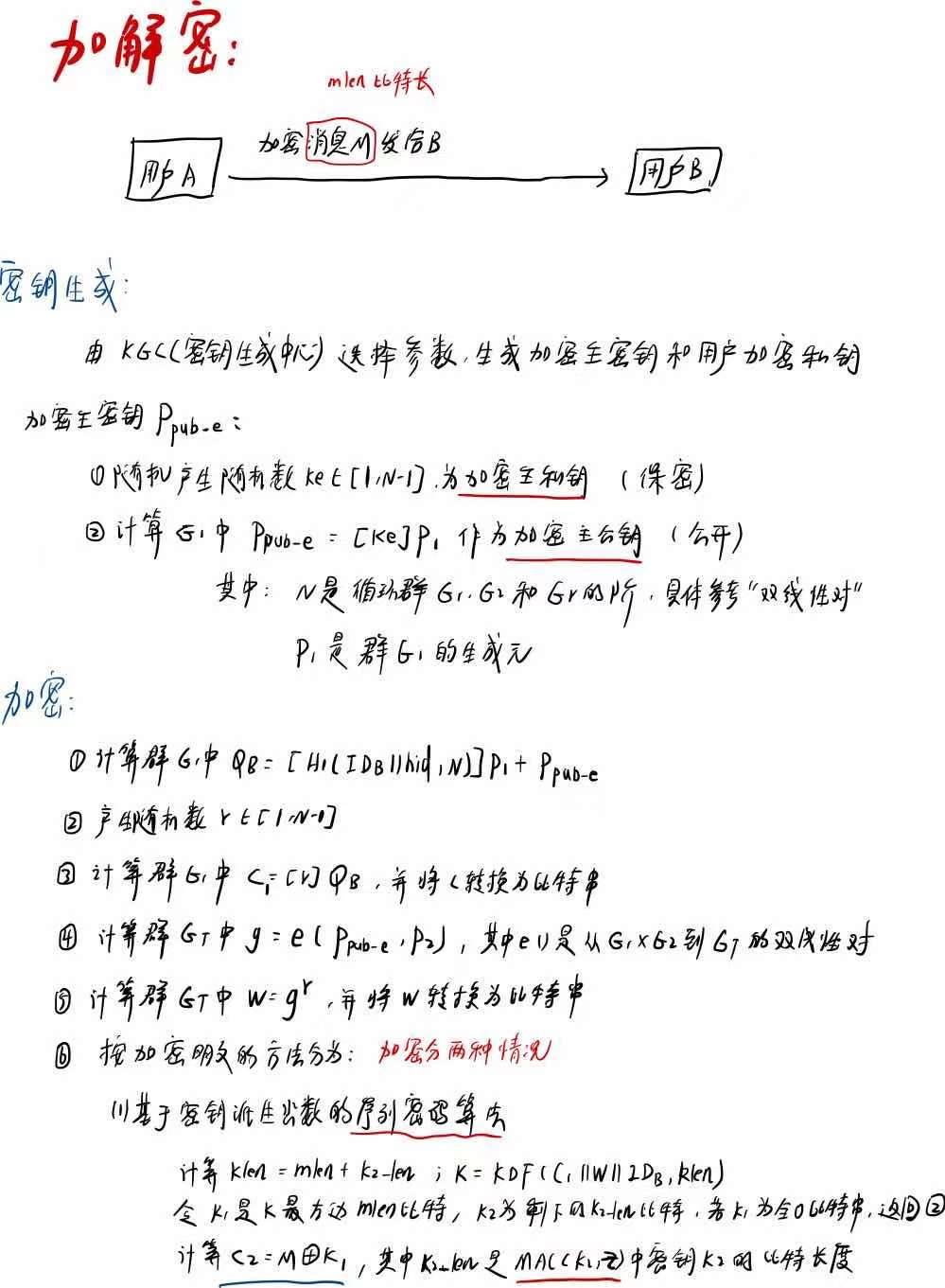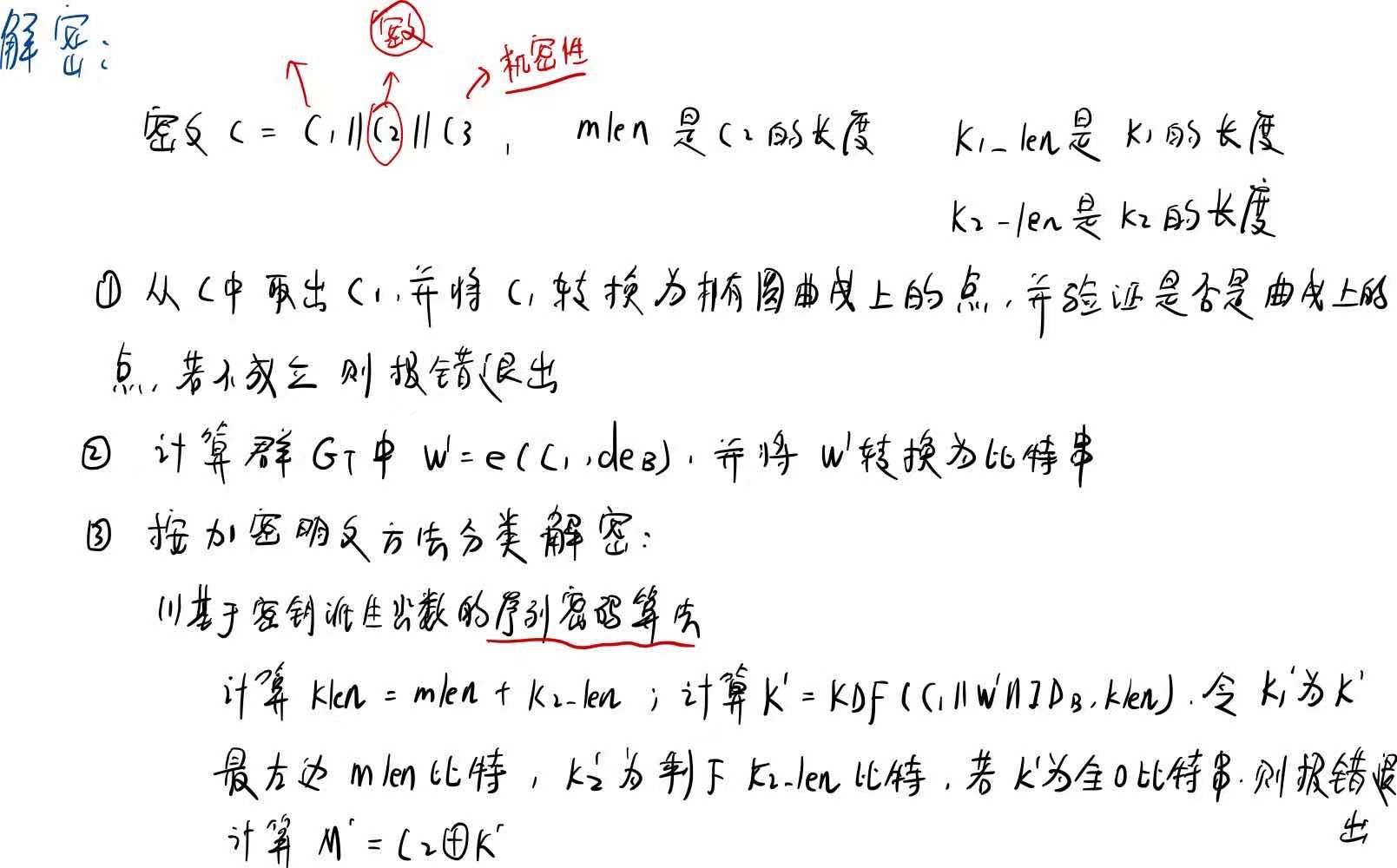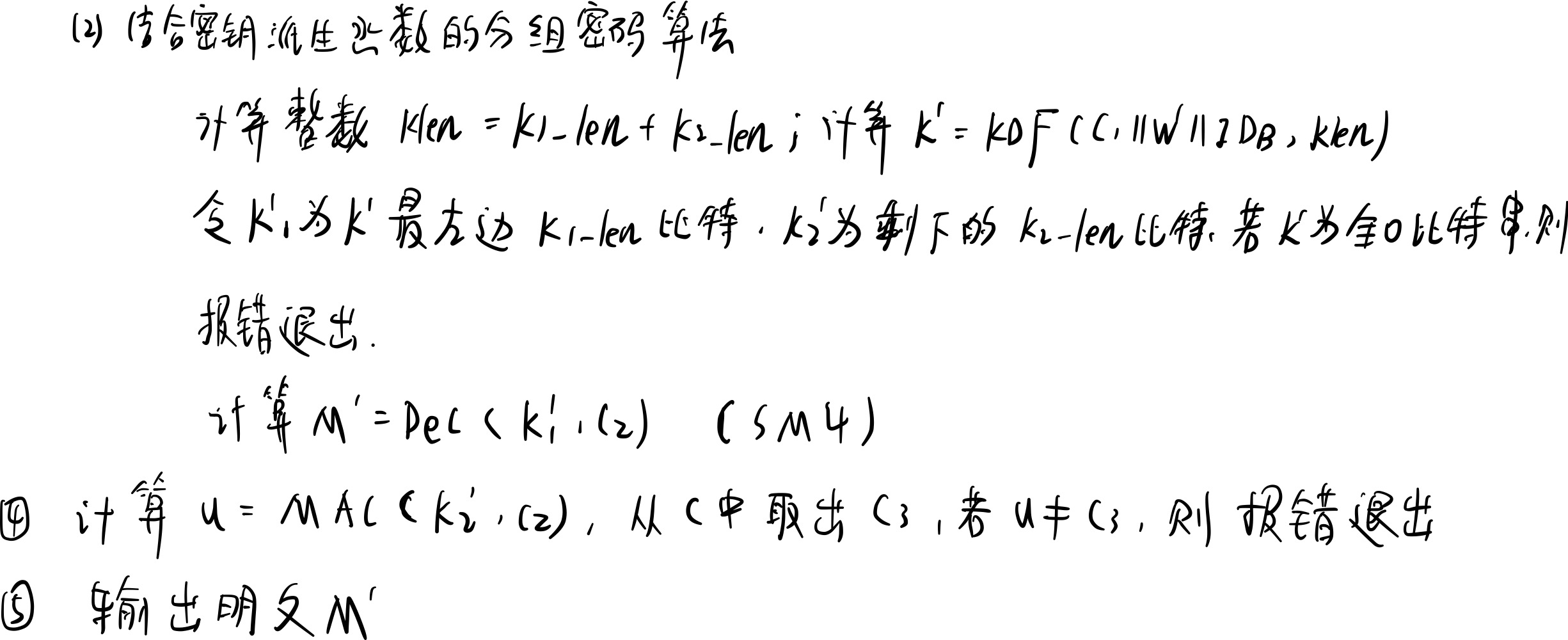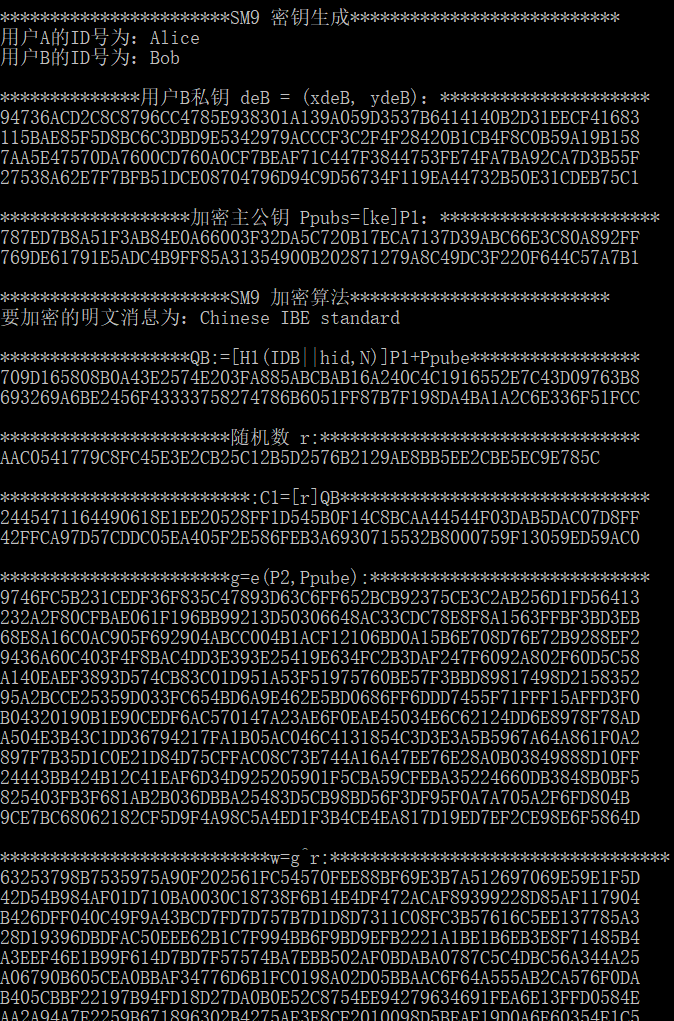SM9-加解密
算法过程




程序实现
///************************************************************************
// File name: SM9_enc_dec.c
// Version: SM9_enc_dec_V1.0
// Date: Dec 29,2016
// Description: implementation of SM9 encryption algorithm and decryption algorithm
// all operations based on BN curve line function
// Function List:
// 1.bytes128_to_ecn2 //convert 128 bytes into ecn2
// 2.zzn12_ElementPrint //print all element of struct zzn12
// 3.ecn2_Bytes128_Print //print 128 bytes of ecn2
// 4.LinkCharZzn12 //link two different types(unsigned char and zzn12)to one(unsigned char)
// 5.Test_Point //test if the given point is on SM9 curve
// 6.SM4_Block_Encrypt //encrypt the message with padding,according to PKS#5
// 7.SM4_Block_Decrypt //decrypt the cipher with padding,according to PKS#5
// 8.SM9_H1 //function H1 in SM9 standard 5.4.2.2
// 9.SM9_Enc_MAC //MAC in SM9 standard 5.4.5
// 10.SM9_Init //initiate SM9 curve
// 11.SM9_GenerateEncryptKey //generate encrypted private and public key
// 12.SM9_Encrypt //SM9 encryption algorithm
// 13.SM9_Decrypt //SM9 decryption algorithm
// 14.SM9_SelfCheck() //SM9 slef-check //
// Notes:
// This SM9 implementation source code can be used for academic, non-profit making or non-commercial use only.
// This SM9 implementation is created on MIRACL. SM9 implementation source code provider does not provide MIRACL library, MIRACL license or any permission to use MIRACL library. Any commercial use of MIRACL requires a license which may be obtained from Shamus Software Ltd. //**************************************************************************/
#include "SM9_enc_dec.h"
#include "kdf.h"
#include "SM4.h" /****************************************************************
Function: bytes128_to_ecn2
Description: convert 128 bytes into ecn2
Calls: MIRACL functions
Called By: SM9_Init,SM9_Decrypt
Input: Ppubs[]
Output: ecn2 *res
Return: FALSE: execution error
TRUE: execute correctly
Others:
****************************************************************/
BOOL bytes128_to_ecn2(unsigned char Ppubs[], ecn2 *res)
{
zzn2 x, y;
big a, b;
ecn2 r;
r.x.a = mirvar(0); r.x.b = mirvar(0);
r.y.a = mirvar(0); r.y.b = mirvar(0);
r.z.a = mirvar(0); r.z.b = mirvar(0);
r.marker = MR_EPOINT_INFINITY; x.a = mirvar(0); x.b = mirvar(0);
y.a = mirvar(0); y.b = mirvar(0);
a = mirvar(0); b = mirvar(0); bytes_to_big(BNLEN, Ppubs, b);
bytes_to_big(BNLEN, Ppubs + BNLEN, a);
zzn2_from_bigs(a, b, &x);
bytes_to_big(BNLEN, Ppubs + BNLEN * 2, b);
bytes_to_big(BNLEN, Ppubs + BNLEN * 3, a);
zzn2_from_bigs(a, b, &y); return ecn2_set(&x, &y, res);
}
/****************************************************************
Function: zzn12_ElementPrint
Description: print all element of struct zzn12
Calls: MIRACL functions
Called By: SM9_Encrypt,SM9_Decrypt
Input: zzn12 x
Output: NULL
Return: NULL
Others:
****************************************************************/
void zzn12_ElementPrint(zzn12 x)
{
big tmp;
tmp = mirvar(0); redc(x.c.b.b, tmp); cotnum(tmp, stdout);
redc(x.c.b.a, tmp); cotnum(tmp, stdout);
redc(x.c.a.b, tmp); cotnum(tmp, stdout);
redc(x.c.a.a, tmp); cotnum(tmp, stdout);
redc(x.b.b.b, tmp); cotnum(tmp, stdout);
redc(x.b.b.a, tmp); cotnum(tmp, stdout);
redc(x.b.a.b, tmp); cotnum(tmp, stdout);
redc(x.b.a.a, tmp); cotnum(tmp, stdout);
redc(x.a.b.b, tmp); cotnum(tmp, stdout);
redc(x.a.b.a, tmp); cotnum(tmp, stdout);
redc(x.a.a.b, tmp); cotnum(tmp, stdout);
redc(x.a.a.a, tmp); cotnum(tmp, stdout);
} /****************************************************************
Function: ecn2_Bytes128_Print
Description: print 128 bytes of ecn2
Calls: MIRACL functions
Called By: SM9_Encrypt,SM9_Decrypt
Input: ecn2 x
Output: NULL
Return: NULL
Others:
****************************************************************/
void ecn2_Bytes128_Print(ecn2 x)
{
big tmp;
tmp = mirvar(0); redc(x.x.b, tmp); cotnum(tmp, stdout);
redc(x.x.a, tmp); cotnum(tmp, stdout);
redc(x.y.b, tmp); cotnum(tmp, stdout);
redc(x.y.a, tmp); cotnum(tmp, stdout);
}
/****************************************************************
Function: LinkCharZzn12
Description: link two different types(unsigned char and zzn12)to one(unsigned char)
Calls: MIRACL functions
Called By: SM9_Encrypt,SM9_Decrypt
Input: message:
len: length of message
w: zzn12 element
Output: Z: the characters array stored message and w
Zlen: length of Z
Return: NULL
Others:
****************************************************************/
void LinkCharZzn12(unsigned char *message, int len, zzn12 w, unsigned char *Z, int Zlen)
{
big tmp; tmp = mirvar(0); memcpy(Z, message, len);
redc(w.c.b.b, tmp); big_to_bytes(BNLEN, tmp, Z + len, 1);
redc(w.c.b.a, tmp); big_to_bytes(BNLEN, tmp, Z + len + BNLEN, 1);
redc(w.c.a.b, tmp); big_to_bytes(BNLEN, tmp, Z + len + BNLEN * 2, 1);
redc(w.c.a.a, tmp); big_to_bytes(BNLEN, tmp, Z + len + BNLEN * 3, 1);
redc(w.b.b.b, tmp); big_to_bytes(BNLEN, tmp, Z + len + BNLEN * 4, 1);
redc(w.b.b.a, tmp); big_to_bytes(BNLEN, tmp, Z + len + BNLEN * 5, 1);
redc(w.b.a.b, tmp); big_to_bytes(BNLEN, tmp, Z + len + BNLEN * 6, 1);
redc(w.b.a.a, tmp); big_to_bytes(BNLEN, tmp, Z + len + BNLEN * 7, 1);
redc(w.a.b.b, tmp); big_to_bytes(BNLEN, tmp, Z + len + BNLEN * 8, 1);
redc(w.a.b.a, tmp); big_to_bytes(BNLEN, tmp, Z + len + BNLEN * 9, 1);
redc(w.a.a.b, tmp); big_to_bytes(BNLEN, tmp, Z + len + BNLEN * 10, 1);
redc(w.a.a.a, tmp); big_to_bytes(BNLEN, tmp, Z + len + BNLEN * 11, 1);
}
/****************************************************************
Function: Test_Point
Description: test if the given point is on SM9 curve
Calls:
Called By: SM9_Decrypt
Input: point
Output: null
Return: 0: success
1: not a valid point on curve Others:
****************************************************************/
int Test_Point(epoint* point)
{
big x, y, x_3, tmp;
epoint *buf; x = mirvar(0); y = mirvar(0);
x_3 = mirvar(0);
tmp = mirvar(0);
buf = epoint_init(); //test if y^2=x^3+b
epoint_get(point, x, y);
power(x, 3, para_q, x_3); //x_3=x^3 mod p
multiply(x, para_a, x);
divide(x, para_q, tmp);
add(x_3, x, x); //x=x^3+ax+b
add(x, para_b, x);
divide(x, para_q, tmp); //x=x^3+ax+b mod p
power(y, 2, para_q, y); //y=y^2 mod p
if (mr_compare(x, y) != 0)
return 1; //test infinity
ecurve_mult(N, point, buf);
if (point_at_infinity(buf) == FALSE)
return 1; return 0;
} /***************************************************************
Function: SM4_Block_Encrypt
Description: encrypt the message with padding,according to PKS#5
Calls: SM4_Encrypt
Called By: SM9_Encrypt
Input:
key:the key of SM4
message:data to be encrypted
mlen: the length of message
Output:
cipher: ciphertext
cipher_len:the length of ciphertext
Return: NULL
Others:
****************************************************************/
void SM4_Block_Encrypt(unsigned char key[], unsigned char * message, int mlen, unsigned char *cipher, int * cipher_len)
{
unsigned char mess[16];
int i, rem = mlen % 16; for (i = 0; i<mlen / 16; i++)
SM4_Encrypt(key, &message[i * 16], &cipher[i * 16]); //encrypt the last block
memset(mess, 16 - rem, 16);
if (rem)
memcpy(mess, &message[i * 16], rem);
SM4_Encrypt(key, mess, &cipher[i * 16]);
}
/***************************************************************
Function: SM4_Block_Decrypt
Description: decrypt the cipher with padding,according to PKS#5
Calls: SM4_Decrypt
Called By: SM9_Decrypt
Input:
key:the key of SM4
cipher: ciphertext
mlen: the length of ciphertext
Output:
plain: plaintext
plain_len:the length of plaintext
Return: NULL
Others:
****************************************************************/
void SM4_Block_Decrypt(unsigned char key[], unsigned char *cipher, int len, unsigned char *plain, int *plain_len)
{
int i;
for (i = 0; i<len / 16; i++)
SM4_Decrypt(key, cipher + i * 16, plain + i * 16);
*plain_len = len - plain[len - 1];
} /****************************************************************
Function: SM9_H1
Description: function H1 in SM9 standard 5.4.2.2
Calls: MIRACL functions,SM3_KDF
Called By: SM9_Encrypt
Input: Z:
Zlen:the length of Z
n:Frobniues constant X
Output: h1=H1(Z,Zlen)
Return: 0: success;
1: asking for memory error
Others:
****************************************************************/
int SM9_H1(unsigned char Z[], int Zlen, big n, big h1)
{
int hlen, i, ZHlen;
big hh, i256, tmp, n1;
unsigned char *ZH = NULL, *ha = NULL; hh = mirvar(0); i256 = mirvar(0);
tmp = mirvar(0); n1 = mirvar(0);
convert(1, i256);
ZHlen = Zlen + 1; hlen = (int)ceil((5.0*logb2(n)) / 32.0);
decr(n, 1, n1);
ZH = (char *)malloc(sizeof(char)*(ZHlen + 1));
if (ZH == NULL) return SM9_ASK_MEMORY_ERR;
memcpy(ZH + 1, Z, Zlen);
ZH[0] = 0x01;
ha = (char *)malloc(sizeof(char)*(hlen + 1));
if (ha == NULL) return SM9_ASK_MEMORY_ERR;
SM3_KDF(ZH, ZHlen, hlen, ha); for (i = hlen - 1; i >= 0; i--)//key[从大到小]
{
premult(i256, ha[i], tmp);
add(hh, tmp, hh);
premult(i256, 256, i256);
divide(i256, n1, tmp);
divide(hh, n1, tmp);
}
incr(hh, 1, h1);
free(ZH); free(ha);
return 0;
} /****************************************************************
Function: SM9_Enc_MAC
Description: MAC in SM9 standard 5.4.5
Calls: SM3_256
Called By: SM9_Encrypt,SM9_Decrypt
Input:
K:key
Klen:the length of K
M:message
Mlen:the length of message
Output: C=MAC(K,Z)
Return: 0: success;
1: asking for memory error
Others:
****************************************************************/
int SM9_Enc_MAC(unsigned char *K, int Klen, unsigned char *M, int Mlen, unsigned char C[])
{
unsigned char *Z = NULL;
int len = Klen + Mlen;
Z = (char *)malloc(sizeof(char)*(len + 1));
if (Z == NULL) return SM9_ASK_MEMORY_ERR;
memcpy(Z, M, Mlen);
memcpy(Z + Mlen, K, Klen);
SM3_256(Z, len, C); free(Z);
return 0;
} /****************************************************************
Function: SM9_Init
Description: Initiate SM9 curve
Calls: MIRACL functions
Called By: SM9_SelfCheck
Input: null
Output: null
Return: 0: success;
5: base point P1 error
6: base point P2 error
Others:
****************************************************************/
int SM9_Init()
{
big P1_x, P1_y; mip = mirsys(1000, 16);;
mip->IOBASE = 16; para_q = mirvar(0); N = mirvar(0);
P1_x = mirvar(0); P1_y = mirvar(0);
para_a = mirvar(0);
para_b = mirvar(0); para_t = mirvar(0);
X.a = mirvar(0); X.b = mirvar(0);
P2.x.a = mirvar(0); P2.x.b = mirvar(0);
P2.y.a = mirvar(0); P2.y.b = mirvar(0);
P2.z.a = mirvar(0); P2.z.b = mirvar(0);
P2.marker = MR_EPOINT_INFINITY; P1 = epoint_init();
bytes_to_big(BNLEN, SM9_q, para_q);
bytes_to_big(BNLEN, SM9_P1x, P1_x);
bytes_to_big(BNLEN, SM9_P1y, P1_y);
bytes_to_big(BNLEN, SM9_a, para_a);
bytes_to_big(BNLEN, SM9_b, para_b);
bytes_to_big(BNLEN, SM9_N, N);
bytes_to_big(BNLEN, SM9_t, para_t); mip->TWIST = MR_SEXTIC_M;
ecurve_init(para_a, para_b, para_q, MR_PROJECTIVE); //Initialises GF(q) elliptic curve
//MR_PROJECTIVE specifying projective coordinates if (!epoint_set(P1_x, P1_y, 0, P1)) return SM9_G1BASEPOINT_SET_ERR; if (!(bytes128_to_ecn2(SM9_P2, &P2))) return SM9_G2BASEPOINT_SET_ERR;
set_frobenius_constant(&X); return 0;
} /***************************************************************
Function: SM9_GenerateEncryptKey
Description: Generate encryption keys(public key and private key)
Calls: MIRACL functions,SM9_H1,xgcd,ecn2_Bytes128_Print
Called By: SM9_SelfCheck
Input: hid:0x03
ID:identification
IDlen:the length of ID
ke:master private key used to generate encryption public key and private key
Output: Ppubs:encryption public key
deB: encryption private key
Return: 0: success;
1: asking for memory error
Others:
****************************************************************/
int SM9_GenerateEncryptKey(unsigned char hid[], unsigned char *ID, int IDlen, big ke, unsigned char Ppubs[], unsigned char deB[])
{
big h1, t1, t2, rem, xPpub, yPpub, tmp;
unsigned char *Z = NULL;
int Zlen = IDlen + 1, buf;
ecn2 dEB;
epoint *Ppub; h1 = mirvar(0); t1 = mirvar(0);
t2 = mirvar(0); rem = mirvar(0); tmp = mirvar(0);
xPpub = mirvar(0); yPpub = mirvar(0);
Ppub = epoint_init();
dEB.x.a = mirvar(0); dEB.x.b = mirvar(0); dEB.y.a = mirvar(0); dEB.y.b = mirvar(0);
dEB.z.a = mirvar(0); dEB.z.b = mirvar(0); dEB.marker = MR_EPOINT_INFINITY; Z = (char *)malloc(sizeof(char)*(Zlen + 1));
memcpy(Z, ID, IDlen);
memcpy(Z + IDlen, hid, 1); buf = SM9_H1(Z, Zlen, N, h1);
if (buf != 0) return buf;
add(h1, ke, t1);//t1=H1(IDA||hid,N)+ks
xgcd(t1, N, t1, t1, t1);//t1=t1(-1)
multiply(ke, t1, t2); divide(t2, N, rem);//t2=ks*t1(-1) //Ppub=[ke]P2
ecurve_mult(ke, P1, Ppub); //deB=[t2]P2
ecn2_copy(&P2, &dEB);
ecn2_mul(t2, &dEB); printf("\n**************用户B私钥 deB = (xdeB, ydeB):*********************\n");
ecn2_Bytes128_Print(dEB);
printf("\n*******************加密主公钥 Ppubs=[ke]P1:**********************\n");
epoint_get(Ppub, xPpub, yPpub);
cotnum(xPpub, stdout); cotnum(yPpub, stdout); epoint_get(Ppub, xPpub, yPpub);
big_to_bytes(BNLEN, xPpub, Ppubs, 1);
big_to_bytes(BNLEN, yPpub, Ppubs + BNLEN, 1); redc(dEB.x.b, tmp); big_to_bytes(BNLEN, tmp, deB, 1);
redc(dEB.x.a, tmp); big_to_bytes(BNLEN, tmp, deB + BNLEN, 1);
redc(dEB.y.b, tmp); big_to_bytes(BNLEN, tmp, deB + BNLEN * 2, 1);
redc(dEB.y.a, tmp); big_to_bytes(BNLEN, tmp, deB + BNLEN * 3, 1); free(Z);
return 0;
} /****************************************************************
Function: SM9_Encrypt
Description: SM9 encryption algorithm
Calls: MIRACL functions,zzn12_init(),ecap(),member(),zzn12_ElementPrint(),
zzn12_pow(),LinkCharZzn12(),SM3_KDF(),SM9_Enc_MAC(),SM4_Block_Encrypt()
Called By: SM9_SelfCheck()
Input:
hid:0x03
IDB //identification of userB
message //the message to be encrypted
len //the length of message
rand //a random number K lies in [1,N-1]
EncID //encryption identification,0:stream cipher 1:block cipher
k1_len //the byte length of K1 in block cipher algorithm
k2_len //the byte length of K2 in MAC algorithm
Ppubs //encrtption public key Output: C //cipher C1||C3||C2
Clen //the byte length of C
Return:
0: success
1: asking for memory error
2: element is out of order q
3: R-ate calculation error
A: K1 equals 0
Others:
****************************************************************/
int SM9_Encrypt(unsigned char hid[], unsigned char *IDB, unsigned char *message, int mlen, unsigned char rand[],int EncID, int k1_len, int k2_len, unsigned char Ppub[], unsigned char C[], int *C_len)
{
big h, x, y, r;
zzn12 g, w;
epoint *Ppube, *QB, *C1;
unsigned char *Z = NULL, *K = NULL, *C2 = NULL, C3[SM3_len / 8];
int i = 0, j = 0, Zlen, buf, klen, C2_len; //initiate
h = mirvar(0); r = mirvar(0); x = mirvar(0); y = mirvar(0);
QB = epoint_init(); Ppube = epoint_init(); C1 = epoint_init();
zzn12_init(&g); zzn12_init(&w); bytes_to_big(BNLEN, Ppub, x);
bytes_to_big(BNLEN, Ppub + BNLEN, y);
epoint_set(x, y, 0, Ppube); //Step1:calculate QB=[H1(IDB||hid,N)]P1+Ppube
Zlen = strlen(IDB) + 1;
Z = (char *)malloc(sizeof(char)*(Zlen + 1));
if (Z == NULL) return SM9_ASK_MEMORY_ERR;
memcpy(Z, IDB, strlen(IDB));
memcpy(Z + strlen(IDB), hid, 1);
buf = SM9_H1(Z, Zlen, N, h);
if (buf) return buf;
ecurve_mult(h, P1, QB);
ecurve_add(Ppube, QB); printf("\n*******************QB:=[H1(IDB||hid,N)]P1+Ppube*****************\n");
epoint_get(QB, x, y);
cotnum(x, stdout); cotnum(y, stdout); //Step2:randnom
bytes_to_big(BNLEN, rand, r);
printf("\n***********************随机数 r:********************************\n");
cotnum(r, stdout); //Step3:C1=[r]QB
ecurve_mult(r, QB, C1);
printf("\n*************************:C1=[r]QB*******************************\n");
epoint_get(C1, x, y);
cotnum(x, stdout); cotnum(y, stdout);
big_to_bytes(BNLEN, x, C, 1); big_to_bytes(BNLEN, y, C + BNLEN, 1); //Step4:g = e(P2, Ppub-e)
if (!ecap(P2, Ppube, para_t, X, &g)) return SM9_MY_ECAP_12A_ERR;
//test if a ZZn12 element is of order q
if (!member(g, para_t, X)) return SM9_MEMBER_ERR;
printf("\n***********************g=e(P2,Ppube):****************************\n");
zzn12_ElementPrint(g); //Step5:calculate w=g^r
w = zzn12_pow(g, r);
printf("\n***************************w=g^r:**********************************\n");
zzn12_ElementPrint(w); free(Z);
//Step6:calculate C2
if (EncID == 0)
{
//基于密钥派生函数的序列密码算法
//加密时间: 0.739000 seconds
//解密时间: 0.156000 seconds
C2_len = mlen;
*C_len = BNLEN * 2 + SM3_len / 8 + C2_len; //Step:6-1: calculate K=KDF(C1||w||IDB,klen)
klen = mlen + k2_len;
Zlen = strlen(IDB) + BNLEN * 14;
Z = (char *)malloc(sizeof(char)*(Zlen + 1));
K = (char *)malloc(sizeof(char)*(klen + 1));
C2 = (char *)malloc(sizeof(char)*(mlen + 1));
if (Z == NULL || K == NULL || C2 == NULL) return SM9_ASK_MEMORY_ERR; LinkCharZzn12(C, BNLEN * 2, w, Z, (Zlen - strlen(IDB)));
memcpy(Z + BNLEN * 14, IDB, strlen(IDB));
SM3_KDF(Z, Zlen, klen, K); printf("\n*****************K=KDF(C1||w||IDB,klen):***********************\n");
for (i = 0; i<klen; i++) printf("%02x", K[i]); //Step:6-2: calculate C2=M^K1,and test if K1==0?
for (i = 0; i<mlen; i++)
{
if (K[i] == 0) j = j + 1;
C2[i] = message[i] ^ K[i];
}
if (j == mlen) return SM9_ERR_K1_ZERO;
printf("\n************************* C2=M^K1 :***************************\n");
for (i = 0; i<C2_len; i++) printf("%02x", C2[i]); //Step7:calculate C3=MAC(K2,C2)
SM9_Enc_MAC(K + mlen, k2_len, C2, mlen, C3);
printf("\n********************** C3=MAC(K2,C2):*************************\n");
for (i = 0; i<32; i++) printf("%02x", C3[i]); memcpy(C + BNLEN * 2, C3, SM3_len / 8);
memcpy(C + BNLEN * 2 + SM3_len / 8, C2, C2_len);
free(Z); free(K); free(C2);
}
else
{
//结合0密钥派生函数的分组密码算法(SM4)
//加密时间: 0.303000 seconds
//解密时间: 0.149000 seconds
C2_len = (mlen / 16 + 1) * 16;
*C_len = BNLEN * 2 + SM3_len / 8 + C2_len; //Step:6-1: calculate K=KDF(C1||w||IDB,klen)
klen = k1_len + k2_len;
Zlen = strlen(IDB) + BNLEN * 14;
Z = (char *)malloc(sizeof(char)*(Zlen + 1));
K = (char *)malloc(sizeof(char)*(klen + 1));
C2 = (char *)malloc(sizeof(char)*(C2_len + 1));
if (Z == NULL || K == NULL || C2 == NULL) return SM9_ASK_MEMORY_ERR; LinkCharZzn12(C, BNLEN * 2, w, Z, Zlen - strlen(IDB));
memcpy(Z + BNLEN * 14, IDB, strlen(IDB));
SM3_KDF(Z, Zlen, klen, K);
printf("\n*****************K=KDF(C1||w||IDB,klen):***********************\n");
for (i = 0; i<klen; i++) printf("%02x", K[i]); //Step:6-2: calculate C2=Enc(K1,M),and also test if K1==0?
for (i = 0; i<k1_len; i++)
{
if (K[i] == 0) j = j + 1;
}
if (j == k1_len) return SM9_ERR_K1_ZERO; SM4_Block_Encrypt(K, message, mlen, C2, &C2_len);
printf("\n*********************** C2=Enc(K1,M) :*************************\n");
for (i = 0; i<C2_len; i++) printf("%02x", C2[i]); //Step7:calculate C3=MAC(K2,C2)
SM9_Enc_MAC(K + k1_len, k2_len, C2, C2_len, C3);
printf("\n********************** C3=MAC(K2,C2):*************************\n");
for (i = 0; i<32; i++) printf("%02x", C3[i]); memcpy(C + BNLEN * 2, C3, SM3_len / 8);
memcpy(C + BNLEN * 2 + SM3_len / 8, C2, C2_len);
free(Z); free(K); free(C2);
}
return 0;
}
/****************************************************************
Function: SM9_Decrypt
Description: SM9 Decryption algorithm
Calls: MIRACL functions,zzn12_init(),Test_Point(), ecap(),
member(),zzn12_ElementPrint(),LinkCharZzn12(),SM3_KDF(),
SM9_Enc_MAC(),SM4_Block_Decrypt(),bytes128_to_ecn2() Called By: SM9_SelfCheck()
Input:
C //cipher C1||C3||C2
C_len //the byte length of C
deB //private key of user B
IDB //identification of userB
EncID //encryption identification,0:stream cipher 1:block cipher
k1_len //the byte length of K1 in block cipher algorithm
k2_len //the byte length of K2 in MAC algorithm
Output:
M //message
Mlen: //the length of message
Return:
0: success
1: asking for memory error
2: element is out of order q
3: R-ate calculation error
4: test if C1 is on G1
A: K1 equals 0
B: compare error of C3
Others:
****************************************************************/
int SM9_Decrypt(unsigned char C[], int C_len, unsigned char deB[], unsigned char *IDB, int EncID,
int k1_len, int k2_len, unsigned char M[], int * Mlen)
{
big x, y;
epoint *C1;
zzn12 w;
ecn2 dEB;
int mlen, klen, Zlen, i, number = 0;
unsigned char *Z = NULL, *K = NULL, *K1 = NULL, u[SM3_len / 8]; x = mirvar(0); y = mirvar(0);
dEB.x.a = mirvar(0); dEB.x.b = mirvar(0); dEB.y.a = mirvar(0); dEB.y.b = mirvar(0);
dEB.z.a = mirvar(0); dEB.z.b = mirvar(0); dEB.marker = MR_EPOINT_INFINITY;
C1 = epoint_init(); zzn12_init(&w); bytes_to_big(BNLEN, C, x); bytes_to_big(BNLEN, C + BNLEN, y);
bytes128_to_ecn2(deB, &dEB); //Step1:get C1,and test if C1 is on G1
epoint_set(x, y, 1, C1);
if (Test_Point(C1)) return SM9_C1_NOT_VALID_G1; //Step2:w = e(C1, deB)
if (!ecap(dEB, C1, para_t, X, &w)) return SM9_MY_ECAP_12A_ERR;
//test if a ZZn12 element is of order q
if (!member(w, para_t, X)) return SM9_MEMBER_ERR;
printf("\n*********************** w = e(C1, deB):****************************\n");
zzn12_ElementPrint(w); //Step3:Calculate plaintext
mlen = C_len - BNLEN * 2 - SM3_len / 8;
if (EncID == 0)
{
//Step3-1:calculate K=KDF(C1||w||IDB,klen)
klen = mlen + k2_len;
Zlen = strlen(IDB) + BNLEN * 14;
Z = (char *)malloc(sizeof(char)*(Zlen + 1));
K = (char *)malloc(sizeof(char)*(klen + 1));
if (Z == NULL || K == NULL) return SM9_ASK_MEMORY_ERR; LinkCharZzn12(C, BNLEN * 2, w, Z, Zlen - strlen(IDB));
memcpy(Z + BNLEN * 14, IDB, strlen(IDB));
SM3_KDF(Z, Zlen, klen, K);
printf("\n*****************K=KDF(C1||w||IDB,klen):***********************\n");
for (i = 0; i<klen; i++) printf("%02x", K[i]); //Step:3-2: calculate M=C2^K1,and test if K1==0?
for (i = 0; i<mlen; i++)
{
if (K[i] == 0) number += 1;
M[i] = C[i + C_len - mlen] ^ K[i];
}
if (number == mlen) return SM9_ERR_K1_ZERO;
*Mlen = mlen; //Step4:calculate u=MAC(K2,C2)
SM9_Enc_MAC(K + mlen, k2_len, &C[C_len - mlen], mlen, u);
if (memcmp(u, &C[BNLEN * 2], SM3_len / 8)) return SM9_C3_MEMCMP_ERR; printf("\n****************************** M:******************************\n");
for (i = 0; i<mlen; i++) printf("%02x", M[i]);
free(Z); free(K);
}
else
{
//Step:3-1: calculate K=KDF(C1||w||IDB,klen)
klen = k1_len + k2_len;
Zlen = strlen(IDB) + BNLEN * 14;
Z = (char *)malloc(sizeof(char)*(Zlen + 1));
K = (char *)malloc(sizeof(char)*(klen + 1));
K1 = (char *)malloc(sizeof(char)*(k1_len + 1));
if (Z == NULL || K == NULL || K1 == NULL) return SM9_ASK_MEMORY_ERR; LinkCharZzn12(C, BNLEN * 2, w, Z, Zlen - strlen(IDB));
memcpy(Z + BNLEN * 14, IDB, strlen(IDB));
SM3_KDF(Z, Zlen, klen, K);
printf("\n*****************K=KDF(C1||w||IDB,klen):***********************\n");
for (i = 0; i<klen; i++) printf("%02x", K[i]); //Step:3-2: calculate M=dec(K1,C2),and test if K1==0?
for (i = 0; i<k1_len; i++)
{
if (K[i] == 0) number += 1;
K1[i] = K[i];
}
if (number == k1_len) return SM9_ERR_K1_ZERO;
SM4_Block_Decrypt(K1, &C[C_len - mlen], mlen, M, Mlen); //Step4:calculate u=MAC(K2,C2)
SM9_Enc_MAC(K + k1_len, k2_len, &C[C_len - mlen], mlen, u);
if (memcmp(u, &C[BNLEN * 2], SM3_len / 8)) return SM9_C3_MEMCMP_ERR;
free(Z); free(K); free(K1);
}
return 0;
} /****************************************************************
Function: SM9_SelfCheck
Description: SM9 self check
Calls: MIRACL functions,SM9_Init(),SM9_GenerateEncryptKey(),
SM9_Encrypt,SM9_Decrypt
Called By:
Input:
Output:
Return: 0: self-check success
1: asking for memory error
2: element is out of order q
3: R-ate calculation error
4: test if C1 is on G1
5: base point P1 error
6: base point P2 error
7: Encryption public key generated error
8: Encryption private key generated error
9: encryption error
A: K1 equals 0
B: compare error of C3
C: decryption error
Others:
****************************************************************/
int SM9_SelfCheck()
{
int MAX_LEN=1024;
//时间定义
time_t begin, end; //the master private key
unsigned char KE[32] = { 0x00,0x01,0xED,0xEE,0x37,0x78,0xF4,0x41,0xF8,0xDE,0xA3,0xD9,0xFA,0x0A,0xCC,0x4E,
0x07,0xEE,0x36,0xC9,0x3F,0x9A,0x08,0x61,0x8A,0xF4,0xAD,0x85,0xCE,0xDE,0x1C,0x22 }; unsigned char rand[32] = {0x00,0x00,0xAA,0xC0,0x54,0x17,0x79,0xC8,0xFC,0x45,0xE3,0xE2,0xCB,0x25,0xC1,0x2B,
0x5D,0x25,0x76,0xB2,0x12,0x9A,0xE8,0xBB,0x5E,0xE2,0xCB,0xE5,0xEC,0x9E,0x78,0x5C };
//standard datas
unsigned char std_Ppub[64] = { 0x78,0x7E,0xD7,0xB8,0xA5,0x1F,0x3A,0xB8,0x4E,0x0A,0x66,0x00,0x3F,0x32,0xDA,0x5C,
0x72,0x0B,0x17,0xEC,0xA7,0x13,0x7D,0x39,0xAB,0xC6,0x6E,0x3C,0x80,0xA8,0x92,0xFF,
0x76,0x9D,0xE6,0x17,0x91,0xE5,0xAD,0xC4,0xB9,0xFF,0x85,0xA3,0x13,0x54,0x90,0x0B,
0x20,0x28,0x71,0x27,0x9A,0x8C,0x49,0xDC,0x3F,0x22,0x0F,0x64,0x4C,0x57,0xA7,0xB1 };
unsigned char std_deB[128] = { 0x94,0x73,0x6A,0xCD,0x2C,0x8C,0x87,0x96,0xCC,0x47,0x85,0xE9,0x38,0x30,0x1A,0x13,
0x9A,0x05,0x9D,0x35,0x37,0xB6,0x41,0x41,0x40,0xB2,0xD3,0x1E,0xEC,0xF4,0x16,0x83,
0x11,0x5B,0xAE,0x85,0xF5,0xD8,0xBC,0x6C,0x3D,0xBD,0x9E,0x53,0x42,0x97,0x9A,0xCC,
0xCF,0x3C,0x2F,0x4F,0x28,0x42,0x0B,0x1C,0xB4,0xF8,0xC0,0xB5,0x9A,0x19,0xB1,0x58,
0x7A,0xA5,0xE4,0x75,0x70,0xDA,0x76,0x00,0xCD,0x76,0x0A,0x0C,0xF7,0xBE,0xAF,0x71,
0xC4,0x47,0xF3,0x84,0x47,0x53,0xFE,0x74,0xFA,0x7B,0xA9,0x2C,0xA7,0xD3,0xB5,0x5F,
0x27,0x53,0x8A,0x62,0xE7,0xF7,0xBF,0xB5,0x1D,0xCE,0x08,0x70,0x47,0x96,0xD9,0x4C,
0x9D,0x56,0x73,0x4F,0x11,0x9E,0xA4,0x47,0x32,0xB5,0x0E,0x31,0xCD,0xEB,0x75,0xC1 }; unsigned char std_C_stream[116] = { 0x24,0x45,0x47,0x11,0x64,0x49,0x06,0x18,0xE1,0xEE,0x20,0x52,0x8F,0xF1,0xD5,0x45,
0xB0,0xF1,0x4C,0x8B,0xCA,0xA4,0x45,0x44,0xF0,0x3D,0xAB,0x5D,0xAC,0x07,0xD8,0xFF,
0x42,0xFF,0xCA,0x97,0xD5,0x7C,0xDD,0xC0,0x5E,0xA4,0x05,0xF2,0xE5,0x86,0xFE,0xB3,
0xA6,0x93,0x07,0x15,0x53,0x2B,0x80,0x00,0x75,0x9F,0x13,0x05,0x9E,0xD5,0x9A,0xC0,
0xBA,0x67,0x23,0x87,0xBC,0xD6,0xDE,0x50,0x16,0xA1,0x58,0xA5,0x2B,0xB2,0xE7,0xFC,
0x42,0x91,0x97,0xBC,0xAB,0x70,0xB2,0x5A,0xFE,0xE3,0x7A,0x2B,0x9D,0xB9,0xF3,0x67,
0x1B,0x5F,0x5B,0x0E,0x95,0x14,0x89,0x68,0x2F,0x3E,0x64,0xE1,0x37,0x8C,0xDD,0x5D,
0xA9,0x51,0x3B,0x1C };
unsigned char std_C_cipher[128] = { 0x24,0x45,0x47,0x11,0x64,0x49,0x06,0x18,0xE1,0xEE,0x20,0x52,0x8F,0xF1,0xD5,0x45,
0xB0,0xF1,0x4C,0x8B,0xCA,0xA4,0x45,0x44,0xF0,0x3D,0xAB,0x5D,0xAC,0x07,0xD8,0xFF,
0x42,0xFF,0xCA,0x97,0xD5,0x7C,0xDD,0xC0,0x5E,0xA4,0x05,0xF2,0xE5,0x86,0xFE,0xB3,
0xA6,0x93,0x07,0x15,0x53,0x2B,0x80,0x00,0x75,0x9F,0x13,0x05,0x9E,0xD5,0x9A,0xC0,
0xFD,0x3C,0x98,0xDD,0x92,0xC4,0x4C,0x68,0x33,0x26,0x75,0xA3,0x70,0xCC,0xEE,0xDE,
0x31,0xE0,0xC5,0xCD,0x20,0x9C,0x25,0x76,0x01,0x14,0x9D,0x12,0xB3,0x94,0xA2,0xBE,
0xE0,0x5B,0x6F,0xAC,0x6F,0x11,0xB9,0x65,0x26,0x8C,0x99,0x4F,0x00,0xDB,0xA7,0xA8,
0xBB,0x00,0xFD,0x60,0x58,0x35,0x46,0xCB,0xDF,0x46,0x49,0x25,0x08,0x63,0xF1,0x0A }; unsigned char *std_message = "Chinese IBE standard";
unsigned char hid[] = { 0x03 };
unsigned char *IDA = "Alice", *IDB = "Bob"; unsigned char Ppub[64], deB[128];
unsigned char message[1000], C[1000];
int M_len, C_len;//M_len the length of message //C_len the length of C
int k1_len = 16, k2_len = 32;
int EncID = 1;//0,stream //1 block
int tmp, i;
big ke; tmp = SM9_Init();
if (tmp != 0) return tmp; ke = mirvar(0);
bytes_to_big(32, KE, ke); printf("\n***********************SM9 密钥生成***************************\n");
printf("用户A的ID号为:%s\n用户B的ID号为:%s\n",IDA,IDB);
tmp = SM9_GenerateEncryptKey(hid, IDB, strlen(IDB), ke, Ppub, deB);
if (tmp != 0) return tmp;
if (memcmp(Ppub, std_Ppub, 64) != 0)
return SM9_GEPUB_ERR;
if (memcmp(deB, std_deB, 128) != 0)
return SM9_GEPRI_ERR; printf("\n***********************SM9 加密算法**************************\n");
printf("要加密的明文消息为:%s\n",std_message);
begin = clock();
tmp = SM9_Encrypt(hid, IDB, std_message, strlen(std_message), rand, EncID, k1_len, k2_len, Ppub, C, &C_len);
end = clock();
printf("\n\n\t\t\t加密时间: %f seconds\n", (double)(end - begin) / CLOCKS_PER_SEC); if (tmp != 0) return tmp;
printf("\n******************************密文为:************************************\n");
for (i = 0; i<C_len; i++) printf("%02x", C[i]);
if (EncID == 0) tmp = memcmp(C, std_C_stream,C_len); else tmp=memcmp(C,std_C_cipher,C_len);
if (tmp) return SM9_ENCRYPT_ERR; printf("\n\n");
printf("\n**********************SM9 解密算法**************************\n");
begin = clock();
tmp = SM9_Decrypt(std_C_cipher, 128, deB, IDB, 2, k1_len, k2_len, message, &M_len);
end = clock(); printf("\n");
message[M_len] = '\0';
printf("明文:%s\n",message);
if (tmp != 0)
return tmp;
if (memcmp(message, std_message, M_len) != 0)
return SM9_DECRYPT_ERR;
printf("\n\n\t\t\t解密时间: %f seconds\n", (double)(end - begin) / CLOCKS_PER_SEC);
printf("\n");
return 0;
}

完整代码见github
参考文献
1、国标—SM9-加解密
2、密码学-基础理论与应用(李子臣著)
3、商用密码检测中心-源码下载
SM9-加解密的更多相关文章
- Java 加解密 AES DES TripleDes
package xxx.common.util; import org.slf4j.Logger; import org.slf4j.LoggerFactory; import javax.crypt ...
- Java 加解密技术系列文章
Java 加解密技术系列之 总结 Java 加解密技术系列之 DH Java 加解密技术系列之 RSA Java 加解密技术系列之 PBE Java 加解密技术系列之 AES Java 加解密技术系列 ...
- C#微信公众号开发系列教程三(消息体签名及加解密)
http://www.cnblogs.com/zskbll/p/4139039.html C#微信公众号开发系列教程一(调试环境部署) C#微信公众号开发系列教程一(调试环境部署续:vs远程调试) C ...
- POCO库——Foundation组件之加解密Crypt
加解密Crypt:内部提供多种加解密方式.信息摘要提取.随机数产生等,具体的算法内部实现不做研究学习: DigestEngine.h :DigestEngine类作为各种摘要提取的基类,提供必要的接口 ...
- .net core中使用openssl的公钥私钥进行加解密
这篇博文分享的是 C#中使用OpenSSL的公钥加密/私钥解密 一文中的解决方法在 .net core 中的改进.之前的博文针对的是 .NET Framework ,加解密用的是 RSACryptoS ...
- rsa互通密钥对生成及互通加解密(c#,java,php)
摘要 在数据安全上rsa起着非常大的作用,特别是数据网络通讯的安全上.当异构系统在数据网络通讯上对安全性有所要求时,rsa将作为其中的一种选择,此时rsa的互通性就显得尤为重要了. 本文参考网络资料, ...
- 两种JavaScript的AES加密方式(可与Java相互加解密)
由于JavaScript属于弱类型脚本语言,因此当其与强类型的后台语言进行数据交互时会产生各种问题,特别是加解密的操作.本人由于工作中遇到用js与Java进行相互加解密的问题,在网上查了很多资料及代码 ...
- iOS,信息加解密
1.AES加解密 AES加解密 // // AESEncryptAndDecrypt.h // NSData扩展方法,用于处理aes加解密 // // Created by Vie on 16/ ...
- C# DES进行加解密
DES加解密 /// 进行DES加密. /// </summary> /// <param name="pToEncrypt">要加密的字符串.</p ...
- DES,AeS加解密,MD5,SHA加密
1.DES一共就有4个参数参与运作:明文.密文.密钥.向量.其中这4者的关系可以理解为: 密文=明文+密钥+向量: 明文=密文-密钥-向量: 为什么要向量这个参数呢?因为如果有一篇文章,有几个词重复, ...
随机推荐
- token、cookie、session的区别
token是验证用户身份的令牌,通常是用于接口的身份验证,一般获取之后放在请求头中 cookie和session的区别: cookie是服务器发送到客户端然后存储在客户端的,可以用来保持用户的登录信息 ...
- XSS跨站脚本之portswigger labs练习
目录 1 什么是XSS 2 XSS的类型有哪些 3 XSS攻击的过程和原理 4 XSS的防御 5 可能会用到的XSS Payload资源 6 靶场训练 portswigger labs 6.1 没有任 ...
- NLP语言学基础
不同的自然语言有不同的语法结构,因此需要对语言数据进行语法解析,才能让机器更准确地学到相应的模式.而语言不同于图像,数据标注工作需要有一定的语言学知识,因此数据的整理也相对更困难.下面以英语为例(别的 ...
- Java多线程设计模式之线程池模式
前序: Thread-Per-Message Pattern,是一种对于每个命令或请求,都分配一个线程,由这个线程执行工作.它将"委托消息的一端"和"执行消息的一端&qu ...
- js之模块导入与导出:export、export default、module.exports、exports
前两者export.export default可为一组,是es6的规范,和import匹配,import是es6中的语法标准:后两者module.exports.exports可为一组,是commo ...
- Jenkins篇-权限管理
我使用 权限管理插件是Role Strategy Plugin,他可以对构建的项目进行授权管理,让不同的用户管理不同的项目,将不同环境的权限进行区分 1)安装插件 系统管理>插件管理查找Role ...
- docker之基本命令(2)
上一篇介绍了一下,docker使用的有些基础命令.这次再来深入的了解一下较为复杂的docker命令 管理指令 说明 docker container 用于管理容器 docker image 用于 ...
- Redis【1】- 如何阅读 Redis源码
1 Redis 的简介 Redis 实际上是简称,全称为 Remote Dictionary Server (远程字典服务器),由 Salvatore Sanfilippo 写的高性能 key-val ...
- 使用conditional 实现线程精准通讯
实现3个线程之间依次执行 比如有3个线程A,B,C ,需要按照顺序执行,ABC,ABC 依次执行. 这个使用可以使用 Lock 的 conditional来实现线程之间精准通讯. 点击查看代码 pac ...
- Yakit靶场-高级前端加解密与验签实战-全关卡通关教程
一.前端验签-SHA256 本文作者为CVE-柠檬i CSDN:https://blog.csdn.net/weixin_49125123 博客园:https://www.cnblogs.com/CV ...
